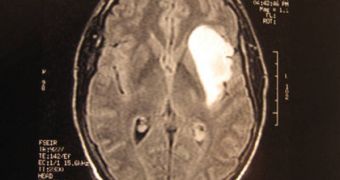A scientific collaboration between experts in the United States and the United Kingdom has revealed a series of genetic warning signs that are a clear indicator of a person's risk of developing brain cancer at one point in their life, in the team's opinion. The new markers are especially oriented on discovering glioma, a formation that is responsible for about 50 percent of all brain cancer tumors. Still, the experts say that, while the find could help detect threats coming from within the body, it cannot account for environmental factors, which also make up a large part of the triggers that eventually lead to the development of brain cancer.
The new paper was published in the latest issue of the scientific journal Nature Genetics, by researchers from the Institute of Cancer, in London, the University of Texas, and the University of California in San Francisco (UCSF). The team argue that they became interested in discovering the causes of brain cancer because roughly 4,550 people are diagnosed with the condition every year, the BBC News reports. Most of these people die before turning five, and the average survival rate passing this period is of 14 percent. The experts argue that, by discovering glioma early on, when it begins to form in the glial cells inside the brain, they could give patients more chances of experiencing an effective treatment.
In order to identify the factors, the team looked at small points in the genetic code, called single nucleotide polymorphisms (SNP). They differ from individual to individual, but a certain trend can be found in people suffering from the same condition. The technique is widely used for a large number of conditions, when researchers want to determine their underlying genetic causes. For this study, more than 521,000 SNP in 1,900 patients were analyzed, and then cross-referenced with those obtained from a 3,670-large healthy control group. The comparison revealed 34 SNP that might be involved with glioma and the development of brain cancer.
“This is a major discovery. We've found the first real evidence that variations in the genes which many people carry can increase their risk of this deadly disease,” Institute of Cancer Research expert, Professor Richard Houlston, says. “We have only just begun to understand the causes of brain tumors. Our findings give reasons for hope for those who might be affected and an incentive for a more comprehensive investigation of what has been,” University of Texas Professor Melissa Bondy, adds.
“Compared with many other cancers, little is known about the lifestyle or genetic factors that influence the risk of developing brain tumors. Identifying these genetic variants will open up new avenues for scientists to explore, helping them to better understand how gliomas develop, identify who might be most at risk and ultimately find improved ways to diagnose and treat the disease,” Cancer Research UK Director of Information Dr. Lesley Walker concludes. The institution offered partial funding for the study.

 14 DAY TRIAL //
14 DAY TRIAL //